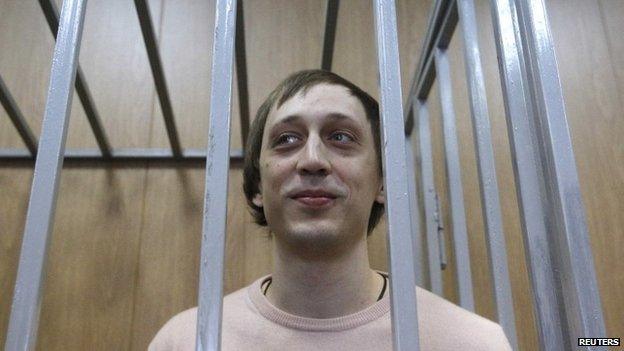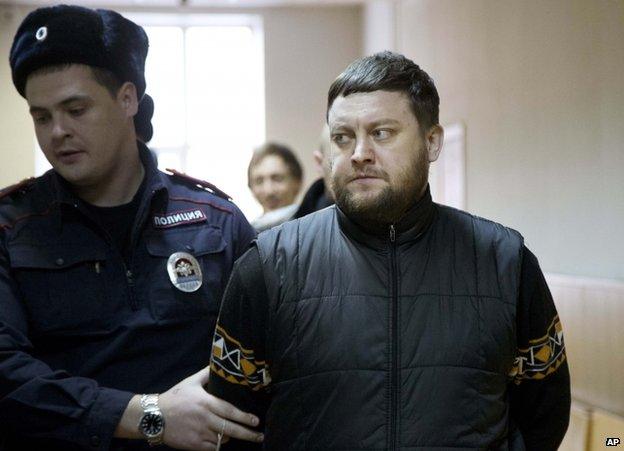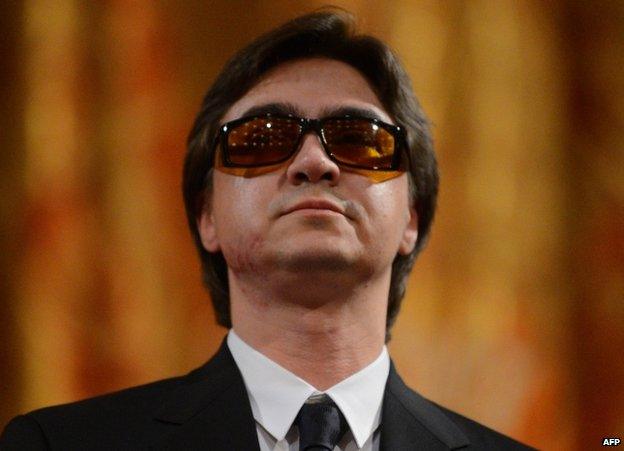Bolshoi acid attack: Soloist Pavel Dmitrichenko jailed
- Published

Pavel Dmitrichenko is due to serve his sentence in a high-security penal colony
A Moscow court has jailed Bolshoi Ballet soloist Pavel Dmitrichenko for six years for organising an acid attack on the company's artistic director.
Two fellow defendants were jailed for 10 and four years.
Sulphuric acid was thrown at Bolshoi artistic director Sergei Filin outside his Moscow flat in January, badly damaging his eyesight.
Dmitrichenko had admitted he wanted Mr Filin "roughed up" but had denied wanting acid thrown into his face.
Investigators said Dmitrichenko had organised the attack because of a conflict with Mr Filin.
The case has revealed bitter rivalries and infighting at the Bolshoi, one of Russia's most famous ballet and opera companies.
"I have no trust in our judicial system"
Twenty operations
When the sentence was announced, Dmitrichenko's mother covered her mouth, the Associated Press reports. The dancer's father said they had expected a less severe sentence.
Lawyers said they would appeal, the news agency added.
Dmitrichenko, 29, is due to serve his sentence in a high-security penal colony.
His fellow defendant Yuri Zarutsky, a former convict, admitted actually throwing the acid. He was sentenced to 10 years in a maximum-security penal colony.
The third man accused, Andrei Lipatov, drove Zarutsky to and from the scene of the attack. He was given four years in a high-security penal colony.
In addition to the prison sentences, Dmitrichenko and his fellow defendants were ordered to pay compensation of 3.5m roubles (£64,300; $105,000; 77,650 euros) to Mr Filin, under a civil suit.
"Their guilt in committing the crime has been established in full," judge Yelena Maximova said.
Zarutsky had argued that throwing acid in Filin's face was his own idea. Lipatov said he had not known where he was taking the other man.
Since the attack near his home in Moscow on 17 January, Mr Filin has had more than 20 operations to try to save his eyesight.
Following treatment in Germany, he returned to Moscow. Wearing dark glasses he gave evidence at the trial.
"The pain was immense and instant," he said of the attack.

Yuri Zarutsky admitted throwing the acid.

Sergei Filin has been replaced at the Bolshoi since the attack.
"It had been a beautiful winter night: silent, white, great drifts of snow falling upon snow. I began scooping up handfuls of it and pressing them into my eyes and cheeks to relieve the agony."
Mr Filin denied he had had any conflict with the dancer, whom he accused of seeking to damage his reputation before the attack through false allegations of affairs with ballerinas and favouritism.
Defence witnesses sought to portray Mr Filin as authoritarian while Dmitrichenko was portrayed as a champion of other performers who feared to speak out against the artistic director.
Shock resignation
The Bolshoi has undergone a number of changes, appointing a new director, Vladimir Urin, who told the BBC in July that the company faced "difficult challenges".
On Monday, the sudden resignation of the Bolshoi's music director and chief conductor, Vasily Sinaisky, was announced without explanation.
Mr Sinaisky made no comment on his departure, according to Russian media. He had been due to conduct Verdi's opera Don Carlos, which is premiering at the theatre in two weeks.
In another development, the Bolshoi said it was not renewing the contract of an aide to Mr Filin, Dilyara Timergazina. Her contract expires at the end of this year.
A source told Russian daily Izvestia that Mr Filin himself would no longer work for the company after his own contract expired in 2016.
Victor Hochhauser, who has promoted the Bolshoi in London for 50 years, told BBC News he was sure the Bolshoi under its new director would put the incident behind it.
"Jealousies are not unknown to me in dealing with other companies too, although this is outside the usual norm of jealousies that we know...," he added.
"This incident, tragic though it was, is not going to affect the artistic level of the company in my view."
British ballet critic Ismene Brown said the episode had done considerable damage to the Bolshoi's reputation.
"It's given the impression of a scandalously run and ill-disciplined troupe of essentially internecine rivalries within the company, and also such a chaotic payment system that seems to depend too much on favours and favouritism," she said.
Dancers only get a relatively decent wage if they win roles, she said. But there have been allegations that roles are not always assigned on merit alone, with claims of bribery, sexual relationships and competing factions behind the scenes all playing a part.
"The most important thing that has to be tackled is this payment system," Mrs Brown said.
"The new general director announced just yesterday [Monday] that there is going to be a trade union agreement with all the dancers. That is the best news possible that could come out of this saga. That old corrupt system from the Soviet time has got to be removed."
Another recent scandal, in which US dancer Joy Womack quit the company claiming she was asked for a $10,000 (£6,000) bribe to dance a solo role, has added to the damage to the Bolshoi's reputation.
"The politicians will take this seriously," Mrs Brown said. "The Bolshoi is their biggest cultural export. It earns fortunes and unlimited prestige. It's now a 'dirty' company. That's got to be cleaned up."
- Published3 December 2013
- Published29 October 2013
- Published29 July 2013